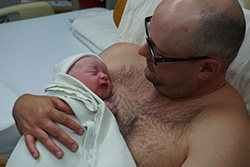 You and your baby will be ready to go home once you have met the discharge criteria on the Patient Pathway. A nurse will check the mother and baby I.D. bands before you leave the hospital.
You and your baby will be ready to go home once you have met the discharge criteria on the Patient Pathway. A nurse will check the mother and baby I.D. bands before you leave the hospital.
Support for You at Home
Your Authorized Provider or midwife will instruct you of follow up care.
If you are concerned about yourself or your baby, you can call your doctor’s office/midwife or the Breastfeeding Support Clinic. Breastfeeding follow up appointments can be booked before going home. Referrals to the Public Health nurse for an early home visit and Healthy Babies Healthy Children follow-up will be discussed prior to discharge.
When to Call Your Doctor or Midwife
For Mother – if you have any of the following problems after you go home:
- Continued heavy, bright red vaginal bleeding
- Fever
- Increased redness, tenderness, swelling or opening of incision and/or foul smelling discharge
- Hot, painful area on your breasts
- Burning or pain when passing urine
- Redness or pain in your legs
- An unhappy, depressed or anxious feeling that does not go away in a few days. You cry a lot. You feel unable to cope or care for your baby
For Baby – if you notice:
- Baby has less than 3 wet diapers on day 3 (after birth) and his/her mouth is dry
- Baby shows no interest in feeding
- Baby becomes very yellow and sleepy
- Bowel movements become unusually frequent, loose, green or an unusual colour, or are mixed with blood
- The umbilical cord has an odour or yellow discharge. (For more information on cord care, see your Let’s Grow – A Healthy Baby Booklet)
Postpartum Adjustment
Women experience many emotions after the birth of a baby, from joy and relief to sadness. Many new mothers feel sad, tired and overwhelmed in the first few days after birth. These feelings are normal and usually disappear after a few days.
In 20% of new mothers, these feelings do not go away. This is called postpartum depression. It can happen any time within the first year after the birth of the baby. Women who have had previous problems with depression are more likely to develop postpartum depression, but it can happen to anyone.
Feeling like you want to harm yourself, your baby or someone else is an EMERGENCY. Call your local hospital emergency room or the Crisis Team at Grey-Bruce Health Services (24-hours a day) at 519-376-2121 or 1-888-525-0552
Feelings and Symptoms
- Not knowing what is wrong
- Frequent crying
- Continual sadness
- Excessive worry
- Feelings of inadequacy, numbness, helplessness, guilt, anger
- Difficulty sleeping
- Changes in appetite
- Over concern or no feelings for baby
- Difficulty caring for baby
- Nervousness
- Difficulty concentrating or making decisions
- Panic attacks
- Feelings of isolation
- Social withdrawal
- Marital difficulties
- Thoughts of suicide
If you have any of these feelings or symptoms, you may have postpartum depression. There is help available for you and your family. Please call and arrange to see your doctor.
Helpful Tips
- Be kind to yourself
- Take time out for yourself
- Rest during the day
- Eat nourishing food
- Exercise
- Don’t set goals that are unreasonable
- Do something daily for yourself
- Take one day at a time
- Learn more about Postpartum Depression
- Find out about Parenting Programs
- Talk to and surround yourself with supportive persons
